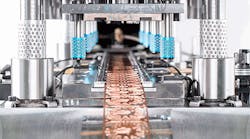Manufacturing is essential to the health of the United States because it creates wealth. Being able to produce goods to sell throughout the world, while creating lucrative careers for people, makes for a strong and healthy economy. Creating products that the world demands creates jobs, which also helps lower unemployment and increase average household incomes.
In today’s manufacturing world, we don’t just require labor, we require skilled labor. This skilled labor pool comes from universities, community colleges, trade schools, and companies themselves. STEM skills are essential to have a good and successful career in manufacturing.
Also, manufacturing is not a national, not regional industry. Plants can be located anywhere in the U.S., creating opportunities for job creation. This fact is greatly overlooked, since some industries, such as the agricultural industry, are dependent on specific regions.
Wiegel Tool Works, Inc. (WTW) seeks to help change the perception of manufacturing careers, which has plagued our industry. As an industry, we do a very poor job marketing ourselves. We allow the media to tell the public who we are and what we do, rather than defining that for ourselves as manufacturers.
WTW is very involved in local and national manufacturing associations. We think it is critical to network with other manufacturers, discuss these issues, and make connections, so we can team up and tackle macro issues. By working collaboratively, we are able to combine our resources to accomplish larger goals and promote manufacturing.
An example is the Technology & Manufacturing Association’s TMA Education Foundation. This foundation was established to promote careers in manufacturing to high school and college students, and to address the skills gap that is going to plague our industry in the next four to seven years.
The foundation raises money from its members to work with local high schools and colleges to educate students, faculty, and guidance counselors on what careers in manufacturing can offer. It also creates grants and scholarships for schools and students. The grants are used to purchase equipment for manufacturing labs in order to create a real working environment for the students to learn. The scholarships help pay for students to attend these schools and acquire the skills they need to become successful in manufacturing careers.
WTW also works to change the perception of manufacturing by getting involved directly with the schools to help promote manufacturing. We open our plant for tours and speak at school events, which allows us access to potential job applicants and gives us the opportunity to explain who we are and what we do. At the same time, the audience gets to see the latest technologies that help produce products they, most likely, have never seen before.
We get a lot of positive feedback from these events. Students are always amazed with what they see and learn, and comment that they did not know working in manufacturing was like this.
WTW is also very active in training the next generation of manufacturers. In 2010, we established a tool & die apprenticeship training program that is certified by the U.S. Department of Labor. This program brings young manufacturers to our plant to acquire the skills needed to become a journeyman tool & die maker.
The apprenticeship program requires 10,000 hours over five years of working on various pieces of manufacturing equipment. The apprentices also are required to go to night classes at a local school for three years to learn the theories and applications needed for the equipment on which they are learning simultaneously.
Finally, we actively pursue media coverage. We seize any opportunity to get into print publications, podcasts, webinars, social media, and speaking engagements. Here again, manufacturers as a group do a poor job marketing ourselves. WTW sees this and is a leader among the manufacturers to get into different media venues, get the message out, and increase positive awareness of opportunities in manufacturing.
There are two things that keep me up at night
--and I don’t know which is going to happen first. The first is the retiring of the baby-boom generation. Currently, manufacturers are seeing a tremendous skills gap shortage. Manufacturing talent is not coming into the labor force as quickly as jobs are being created. To compound this, the current labor force is older and, when the baby boom generation starts to retire, I see our skilled labor shortages becoming a crisis.
I preach this often among business leaders in manufacturing, and the message is starting to resonate. This is another reason we started the apprentice training program back in 2010. We saw this coming and wanted to have an established program up and running to get new skilled employees through our system.
I also want a pipeline of talent into our skilled labor pool in order to maintain consistency. I am encouraged to see a spike in graduating students from local community colleges and associations through similar programs that we have established. A lot has been done and growth has taken place; however, it is still not enough. We simply need to do more.
The second thing is, I feel we may get hit by another recession. Although the unemployment rate has gone down, the average household income has remained stagnant; families are not seeing their wages rise. That stagnation is not the case in U.S. manufacturing because, where there is a shortage of skilled labor, simple supply and demand will tell you wages must increase to attract talent.
However, we are seeing skilled labor move from one plant to the next, instead of new skilled labor being created. Rising wages will hopefully attract more people into our industry.
Unfortunately, we cannot say the same for the rest of the U.S. economy, which concerns me. Couple that with interest rates that have not gone up since 2009, and you will see the signs that sooner or later a recession is bound to happen.
We are especially looking for how the Internet of Things will continue to transform manufacturing businesses. I can confidently say WTW embraces technology. This has been the philosophy of our company since it was founded back in 1941 by my grandfather. You must have a highly skilled labor force, and you must have the latest technologies to remain competitive globally.
Whether it’s new equipment, including automation/robots, ERP systems, or efficiency tracking software, we incorporate these technologies to stay ahead of our global competition. It is simply in our DNA.
I believe the one sector that will continue to remain strong is the automotive sector. Today’s vehicle is rapidly evolving with the adoption of the IoT and technology. Today’s car is syncing with computer systems that allow it to do so many great things, which will make it hard for consumers to avoid continually upgrading their vehicles.
Whether it is GPS, camera systems, self-driving technology, or syncing to smart phones, automakers keep adding features that will stave off a sector decline.
Another growing sector is medical technology. With the Affordable Care Act (ACA) in effect, millions more Americans now have health care coverage. More Americans seeking treatment will drive the need to lower overall costs in healthcare, resulting in greater growth potential in the sector.
Aaron Wiegel, president of Wiegel Tool Works, Inc., is also the vice chairman of the Technology & Manufacturing Association.



